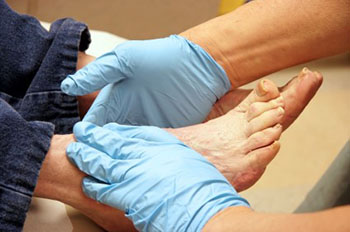Connect With Us
Diabetic Foot

Unfortunately, people with diabetes often have complications and problems with their feet related to their diabetes. As time goes by, it’s likely that diabetes can cause nerve damage, also known as diabetic neuropathy. This can lead to tingling or burning sensations in your feet, or even loss of feeling. This loss of feeling can become incredibly dangerous, especially if you can no longer feel a blister or cut on your foot and it takes a turn for the worse.
There are several things you can do at home to maintain good foot health with diabetes. Most importantly, you want to ensure that you’re managing your blood glucose levels, otherwise known as your blood sugar. You also want to make sure that you’re checking your feet daily so that any new troubling foot condition is caught early before it becomes a major concern. You should also wash and dry your feet daily with lukewarm water, taking extra care to dry well between your toes afterward. It may be useful in certain cases to moisturize your feet a few times a week, especially if you’re prone to dry skin. Please be advised, however, to avoid moisturizing between the toes as these are areas that tend to retain moisture and may not dry properly. People with diabetes are at high risk of self-injury if they attempt to trim their own toenails at home. Due to other complications related to their diabetes, they may be unable to see or feel well enough to cut their own toenails without injury. For this reason, those with diabetes should receive regular care from a podiatrist for this issue. Likewise, you should seek the professional help of a podiatrist if you develop a corn or callus and avoid treating it yourself. It may also be beneficial to purchase socks made specifically for those with diabetes for extra cushion and protection. Those with diabetes should always avoid barefoot walking, and wear appropriately protective footwear that is neither too tight nor too loose to avoid injury or accident.
If you ever notice a new cut, blister, wound, or other signs of infection to your feet and you have diabetes, it is extremely important to schedule an appointment with your podiatrist as soon as possible.
If you would like more information on how to maintain healthy feet while living with diabetes, seek the assistance of a podiatrist to help you protect and preserve your feet.
